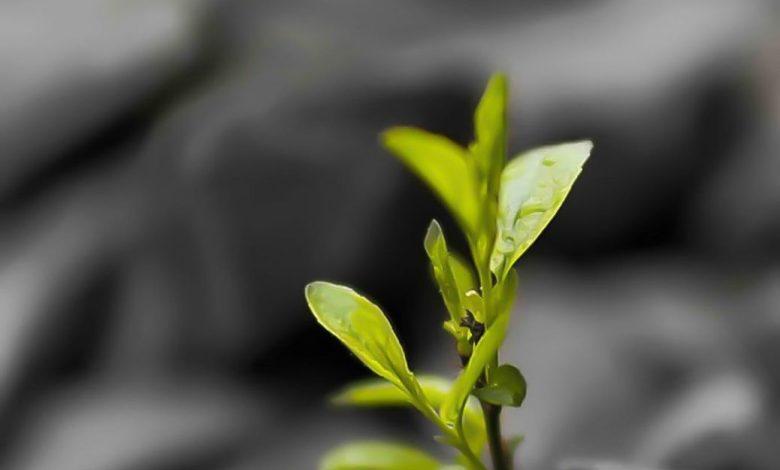
- From Eden to Earth: The Trees We Still Eat From
“And We said: O Adam, dwell you and your wife in the Garden and eat freely of it wherever you may will, but do not approach this tree lest you become wrongdoers.” — Qur’an 2[Al-Baqarah]:35
The story of Adam and Hauwa has been passed down through generations, told in different traditions and faiths. But at its core, it’s not just a tale of the first humans — it’s a mirror of our lives today. The forbidden tree in Eden is often seen as a symbol of temptation, representing the human struggle with desire.
What if I told you we’re still eating from that tree today? The symbolic “trees” that tempt us have evolved in our modern world. These “trees” take on new forms, and the distractions they offer pull us away from our higher purpose, from meaning, and, for some, from the worship of Allah — The Most High.
The Original Sin
In Islam, the concept of original sin differs significantly from the Christian view. The story of Adam and Hauwa’s disobedience is present, but the Islamic understanding emphasizes individual responsibility for sin rather than a hereditary sin passed down to humanity.
Allah created Adam from clay and breathed into him His spirit. He was then placed in Paradise with his wife, Hauwa, who was created from Adam’s rib. The instruction given to both of them was to enjoy all the bounties therein except for one: the fruit of a specific tree.
Despite the command, Adam and Hauwa were tempted by Shaytan, who whispered to them, convincing them to eat from the forbidden tree. Once Adam and Hauwa ate from the tree, they realized their error, but their immediate reaction was to repent.
The Qur’an captures their sincere repentance:
“They said: ‘Our Lord, we have wronged ourselves, and if You do not forgive us and have mercy upon us, we will surely be among the losers.’” — Qur’an 7[Al-’Araf]:23
Allah, in His infinite mercy, forgave them and accepted their repentance. This is where there’s a disparity with Christianity on the original sin, which is believed to have been passed down from Adam and Hauwa to all of humanity. Islam teaches that no person bears the burden of another’s sin. Every individual is responsible for their actions and choices.
The Devil’s Deception
Muslims believe that Shaytan played a significant role in tempting Adam and Hauwa. Islam does not view the devil’s influence as an eternal curse on humanity. Rather, Satan is seen as a persistent tempter whose goal is to lead people astray. His refusal to obey Allah’s command to bow to Adam out of pride led to his banishment, and ever since, he has sought to mislead humanity. Here’s how the plot unfolds in the Quran:
We created you, We gave you shape, and then We said to the angels, ‘Bow down before Adam,’ and they did. But not Iblis — Satan: he was not one of those who bowed down. God said, ‘What prevented you from bowing down as I commanded you?’ and he (Satan) said, ‘I am better than him: You created me from fire and him from clay.’ God said, ‘Get down from here! This is no place for your arrogance. Get out! You are contemptible!’ but Iblis said, ‘Give me respite until the Day people are raised from the dead,’ and God replied, ‘You have respite.’ And then Iblis said, ‘Because You have put me in the wrong, I will lie in wait for them all on Your straight path: I will come at them- from their front and their back, from their right and their left- and You will find that most of them are ungrateful.’ — Qur’an 7[Al-’Araf]:11–17
The same idea of Shaytan deceiving humanity and luring them towards desires with false hope has remained the same since the days of Adam. There has only been a change in tactics from time to time.
The Modern Trees
It’s important to note that Allah has given humans free will and the acumen to overcome Satan’s temptations through an intellectual ability to discern what’s right from what’s wrong. However, humans will be human as they’re bound to sin. Besides, the tricks of Iblis in today’s age have metamorphosed from the forbidden tree into several irresistible fruits. Here’s to mention a few:
The Tree of Consumerism: Always Wanting More
In today’s world, one of the most prominent trees we constantly “eat” from is consumerism. We live in a society that values material possessions, often defining success by how much we own. We’re told to buy more, achieve more, accumulate wealth, and seek pleasure in the next new thing. The race for more has become endless. Advertisements, social media, and even societal norms pull us toward this tree daily, promising happiness and fulfillment.
But here’s the problem: this tree is never satisfying. The more we consume, the more we want. We’ve become like our foreparents, Adam and Hauwa, in that moment of temptation — drawn to something that seems desirable but, in reality, only pulls us further from what matters. The Qur’an offers a profound reminder about this:
The mutual rivalry for piling up worldly things diverts you until you end up in your graves. Nay! you shall come to know… — Qur’an 102[At-Takathur]:1–3
This verse reminds us of the fleeting nature of material wealth and how easy it is to become distracted from life’s true purpose. While Islam doesn’t stop you from acquiring wealth, it encourages you not to transgress limits with greed. This isn’t just an Islamic teaching — most spiritual traditions warn against getting lost in the lust for worldly gains alone.
2. The Tree of Distraction: Technology and Entertainment
Another tree we regularly eat from is the endless distraction of technology and entertainment. While these tools can be used for good, they often pull us into a cycle of constant stimulation, leaving little room for self-reflection, mindfulness, or spiritual growth. We scroll through social media, binge-watch shows, and lose hours in front of screens. Meanwhile, moments that could be spent connecting with our inner selves or with loved ones slip by.
There’s a saying of the Prophet Muhammad ﷺ, where he cautioned us thus: There are two blessings that many people lose: health and free time. — Bukhari
This is a profound reminder that time is a gift, and how we use it matters. Many of us these days trade this gift for temporary distractions, much like Adam and Hauwa traded their time in Paradise for the fleeting allure of the forbidden tree. We live in an age where time is precious, and how we use it speaks to where our values lie. Are we investing it in relationships, personal growth, and things that uplift us? Or are we distracted by what is ultimately meaningless?
3. The Tree of Ego: In Pursuit of Fame, Power and Status
Pursuing status and recognition is another tree that often distracts us from our true purpose. In a world where the new media encourages us to seek validation through likes, shares, and followership, the need for recognition can easily consume us. The desire to be seen, admired, and praised is a strong one. In the same way, we hate to be criticized and fall for the fear of missing out. This is such a dangerous tree to eat from, especially for the younger generation.
Abdullah ibn Mas’ud reported: The Prophet, peace and blessings be upon him, said, “No one who weights a seed of arrogance in his heart will enter Paradise.” A man said, “But a man likes to have nice clothes and shoes.” The Prophet said, “Verily, Allah is beautiful, and He loves beauty. Arrogance is to disregard the truth and to look down upon people.” — Ṣaḥīḥ Muslim.
This is a universal truth that serves as a reminder for everyone. We need to put our ego in check as the pursuit of ego often leaves us feeling empty and disconnected from what truly gives life meaning.
Cutting Down These Trees
So, how do we stop eating from these trees? How do we avoid the constant pull of consumerism, distraction, and ego? It begins with a shift in perspective.
In Islam, the idea of detaching from worldly distractions is deeply rooted in the belief that life is temporary and that our ultimate purpose is to worship and serve the Creator.
Even for those who don’t follow a specific faith, the principle of seeking purpose beyond materialism is powerful. We need to ask ourselves: What is our higher purpose? What are we dedicating our lives to?
Here are a few practical steps we can all take:
Mindful Consumption: Being conscious of what we buy and why. Do we truly need it, is it just a want, or are we filling a void with these material things?
Limiting Screen Time: It is important to set intentional limits on the time we spend on technology, especially when it’s not valuable to our lives. This could be as simple as designating screen-free times during the day to focus on meaningful activities. In a nutshell, create time to unplug!
Acts of Service: Engaging in acts of kindness and service to others. When we shift our focus from ourselves to others, we realize that life is much bigger than our desires. As the Prophet Muhammad — peace be upon him said: “The most beloved of people to Allah are those who are most beneficial to others” — At-Tabarani.
Daily Reflection with Gratitude and Repentance: Take time every day to reflect on what truly matters: Your purpose of existence: why are you truly here? It is equally essential to create time to express gratitude for the things we often take for granted — all the numerous gifts and blessings bestowed upon us by Allah. And never forget to repent back to Allah every day consistently.
Planting the right seeds: While we can’t eliminate the metaphorical trees of today’s world, we can plant seeds that will yield fruits in the future and the afterlife. By pushing forth good deeds that will benefit humanity, we will be creating a better world for all to live.
Connection with Allah: What is your purpose of existence, and why are you here? Do you think you’re created for mere play and amusement? Many of us have forgotten that our primary purpose of existence is to worship Allah— The One and Only Supreme Being. Keep up with your prayers on time and strive to fulfill Allah’s injunctions.
Don’t leave the fold of Islam: Some of these bitter fruits we eat today are taking us out of faith. Sorcery, liberalism, free-thinking, and many more ideologies alien to Islam that we adopt unconsciously can make us lose Eeman. No matter what you face, do not sell your Islam for a piece of cake.
And worship your Lord until there comes to you the certainty [i.e., death]. — Qur’an 15[Al-Hijr]:97
Conclusion
Ultimately, the goal is to stop eating from the wrong trees and start planting the right ones — trees that will bear the fruit of lasting fulfillment, peace, and purpose. Whether you believe in Allah or not, the lesson is the same: the things we chase in this life should be meaningful, fulfilling, and aligned with our highest values.
The key is not to be distracted by the temptations around us but to stay focused on what will truly nourish our souls in the long run. After all, the trees we choose to eat today shape the life we live tomorrow. So, let’s choose wisely.
Finally, I leave you with the words of Allah, The Majestic and Supreme Being:
Bear in mind that the present life is just a game, a diversion, an attraction, a cause of boasting among you, of rivalry in wealth and children. It is like plants that spring up after the rain: their growth at first delights the sowers, but then you see them wither away, turn yellow, and become stubble. There is terrible punishment in the next life, as well as forgiveness and approval from Allah; the life of this world is only an illusory pleasure. — Qur’an 57[Al-Hadid]:20
We ask Allah not to let us become attached to this world more than necessary and to guide us to His worship and love. Amin!




